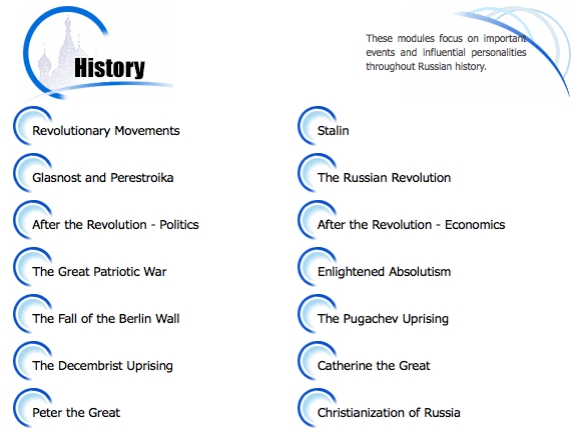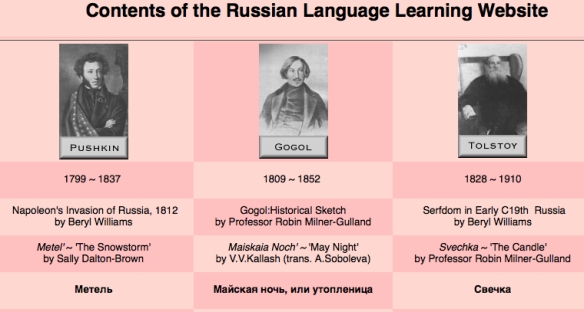The University of Sussex’s Russian Language Learning on the Web contains glossed works by Pushkin, Gogol, Tolstoy and Blok, complete with: historical background and literary criticism in English; a side-by-side English-Russian translation; comprehension, vocabulary and grammar exercises; grammatical explanations; audio recordings of the texts; and videos of native speakers discussing the texts.
Tag Archives: vocabulary
Отрезал.РУ
Отрезал.РУ is an online dictionary of Russian idioms, sayings, film quotes, and other language chunks that provides historical background on these phrases as well as their meaning. Advanced students of Russian can use this website as an aid while reading texts, or, alternatively, browse the entries to learn new expressions like белая ворона or to find out when to use the phrase зубы заговаривать.
SRAS Russian Mini Lessons
The School of Russian and Asian Studies contains many excellent resources for students learning Russian and those who are interested in studying abroad in Russia and Eurasia. Their Russian Mini Lessons provide cultural background knowledge and vocabulary on a variety of topics: religion and folklore, politics and military, village life, business, love and friendship, birth, health and safety, science and technology, and others. The lessons introduce readers to key words, phrases, and idiomatic expressions related to the topic. Use this resource to add new vocabulary to your vocabulary log, or simply to beef up your knowledge on Russian culture.
Russnet Language Learning Modules
 Russnet is home to 30 in-depth Russian language learning modules on various topics in history, literature, culture, and science. Modules include: texts and video on the topics; reading comprehension, grammatical, and lexical exercises; and writing prompts. They can be used by independent learners, or by teachers as a supplement to in-class work. Use of the modules requires a login but registration is free.
Russnet is home to 30 in-depth Russian language learning modules on various topics in history, literature, culture, and science. Modules include: texts and video on the topics; reading comprehension, grammatical, and lexical exercises; and writing prompts. They can be used by independent learners, or by teachers as a supplement to in-class work. Use of the modules requires a login but registration is free.
Made in USSR
Made in USSR is a repository of photos of Soviet artifacts, including movie posters, art, postcards, toys, food, souvenirs, and other objects. This collections provides a wealth of Soviet-era realia that can be used by teachers for various activities in the classroom. Independent learners can also browse the pictures and study the language of the materials to acquire new vocabulary and improve reading skills.
Russian Word of the Day
Russian Word of the Day provides detailed information on a new vocabulary word every day, complete with declension/conjugation charts, detailed explanations, common collocations, related idiomatic expressions, grammatical notes, and contextual usage with English translations. Covers words of all parts of speech, slang, idioms, and a variety of subjects. Subscribe to the blog’s RSS feed to learn a new word each day.
Учитесь!
Russian Life magazine has provided PDF copies of the Russian language learning supplement Учитесь published in the magazine. The lessons focus on famous writers and artists, and contain several texts as well as exercises on reading comprehension, vocabulary development, and grammar. These lessons can be used by teachers in the classroom or by independent learners.
Simplified Russian Webcasts
The National Capital Language Resource Center provides the excellent resource Новости недели на упрощённом русском языке (simplified Russian webcasts) twice monthly. These authentic news reports are slowed down and accompanied by glossed vocabulary and exercises to improve your listening comprehension. Refer to the site for tips on working with these webcasts.
Russian Blog: Language and Culture of the Russian-Speaking World
Transparent Language’s Russian Blog is one of the most useful and best written Russian language blogs on the Internet. Posts are written in English but contain Russian words and phrases with translations, detailed explanations, and stress marks. Topics cover a wide variety of cultural and linguistic issues: Russian poetry, Soviet cartoons, pop music, cuisine, history, grammar, fairy tales, idioms, literature, and much more. Subscribe to the RSS feed or signup for the email list to receive blog posts as they are published (every few days). Record any interesting words or phrases in a vocabulary log, and read further about post topics you find interesting.
Русские фразеологизмы в картинках
 A Book of Russian Idioms Illustrated contains almost 600 Russian idioms accompanied by drawings, literal translations, explanations, and English equivalents. You can use it as a dictionary, to gain deeper understanding of the idioms you come across in reading, or use it to discover new idioms and expand your knowledge of idiomatic Russian. Keep track of the idioms you’re learning in a vocabulary log.
A Book of Russian Idioms Illustrated contains almost 600 Russian idioms accompanied by drawings, literal translations, explanations, and English equivalents. You can use it as a dictionary, to gain deeper understanding of the idioms you come across in reading, or use it to discover new idioms and expand your knowledge of idiomatic Russian. Keep track of the idioms you’re learning in a vocabulary log.







